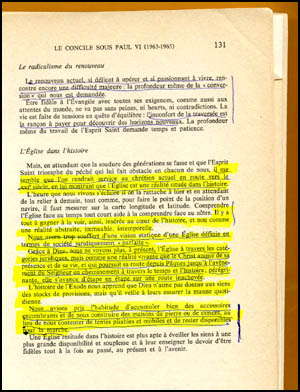Cardinal Suenens was one of the most important Prelates who played a decisive role in the Second Vatican Council. He was the man who proposed setting aside the more than 70 conservative schemas that had been prepared for the Council and replaced them with the 18 progressivist ones, which became the basis for the 16 final documents of Vatican Council II. He was one of the four Moderators chosen by Paul VI to direct the debates in the conciliar assembly. He also was one of the greatest inspirers of Lumen gentium and Gaudium et spes.
We present a text in which Suenens clearly attacks the conception of the Church as a solid and stable institution that was always sustained until Vatican II.
Top right is a facsimile of the book cover; at right , a photocopy of the French original. Below, we present our translation.
"It seems to me that we may help the present day Christian who wanders on the road toward the 21st century by showing him that the Church is a reality placed in History.
"The present hour becomes clearer when we link it to yesterday in order to reach tomorrow, just as to know a ship's position it is necessary to view its longitude and latitude on a map. To understand how the Church faced past times helps us to understand how she faces our time. We should see her inserted in the heart of History, and not as an abstract, immutable and timeless reality.
"For too long we have suffered from a static vision of the Church defined in terms of a juridically perfect society.
"Today, thank God, we do not view the Church with those juridical criteria any longer, but rather as a living reality that Christ animates with His presence and His life .... A pilgrim, she goes forward, walking step by step on an unknown road.
"The history of the Exodus teaches us that God does not like to provide his people with stocks of supplies, but rather He watches to make sure that the daily manna is there.
"We became accustomed to accumulate lots of unecessary goods and to build stone or cement houses, instead of being happy having simple folding tents and able to roam freely."
(Leo Jozef Suenens, Souvenirs et Esperances, Paris: Fayard, 1991, p. 131. |


|

Posted on August 5, 2005
|
